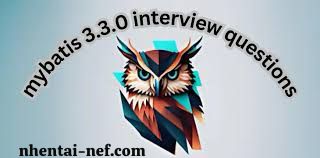
Understanding MyBatis 3.3.0
What is MyBatis, and How Does It Differ from Other ORM Frameworks?
MyBatis is a powerful persistence framework that enables developers to interact with relational databases using an object-oriented approach. Unlike traditional Object-Relational Mapping (ORM) frameworks like Hibernate, which automate most of the SQL generation, MyBatis 3.3.0 Interview Questions: Tips and Tricks for a Successful Interview, MyBatis allows developers greater control over SQL statements. This flexibility is crucial for applications requiring fine-tuned SQL performance or complex queries.
MyBatis provides a straightforward mapping mechanism between SQL databases and objects in your application. This feature is particularly beneficial in scenarios where complex queries or optimizations are necessary, as it allows developers to write their SQL while still benefiting from the framework’s mapping capabilities.
Key Features of MyBatis 3.3.0: mybatis 3.3.0 interview questions
Improved Mapper Interface
One of the standout features of MyBatis 3.3.0 is the improved Mapper interface. Mappers in MyBatis act as a bridge between the SQL queries and Java methods. In version 3.3.0, developers can define their interfaces more easily, enhancing readability and maintainability. This improvement facilitates cleaner code, making it easier for developers to implement complex data access logic without convoluted configurations.
Dynamic SQL: mybatis 3.3.0 interview questions
Dynamic SQL is another vital feature that enables developers to construct SQL statements dynamically at runtime. This capability allows for more flexible and adaptable queries that can change based on user input or application state. For instance, in scenarios where search filters are optional, developers can use MyBatis’s <if> and <choose> tags to build queries dynamically, which greatly reduces boilerplate code and enhances performance.
Enhanced Type Handlers: mybatis 3.3.0 interview questions
MyBatis 3.3.0 also introduces enhanced type handlers, which streamline the process of mapping Java types to database types. This feature is particularly useful when dealing with custom types or complex objects. Developers can create custom type handlers that dictate how specific Java types are translated to and from SQL data types. This flexibility can be crucial in applications with complex data models or when integrating with legacy systems.
Performance Improvements
Performance is always a concern for developers, and MyBatis 3.3.0 addresses this by offering various optimizations. The framework has been fine-tuned to reduce overhead and improve execution time, making it a robust choice for high-performance applications. Enhanced caching mechanisms, batch processing capabilities, and more efficient transaction management all contribute to the overall performance boost.
Common MyBatis 3.3.0 Interview Questions
: mybatis 3.3.0 interview questions
Preparing for an interview focused on MyBatis 3.3.0 can be daunting, but understanding common questions can greatly help. Below are some typical interview questions you may encounter:
1. What is MyBatis, and How Does It Differ from Other ORM Frameworks?
: mybatis 3.3.0 interview questions
This foundational question tests your understanding of MyBatis as a framework. Be prepared to explain how MyBatis provides a more hands-on approach to SQL compared to traditional ORMs, emphasizing its flexibility and control over database interactions.
2. Explain the Configuration of MyBatis.
: mybatis 3.3.0 interview questions
Configuration in MyBatis typically involves creating a SqlSessionFactory and defining an XML configuration file. In your response, discuss the significance of this configuration and how it allows you to set up database connections, SQL mappings, and more. Additionally, mention the use of annotations as an alternative to XML configuration.
3. What Are MyBatis Mappers, and How Do They Work?
: mybatis 3.3.0 interview questions
Mappers are central to MyBatis’s architecture. Explain that they define the methods used to perform database operations and map SQL statements to those methods. Highlight how MyBatis allows for both XML and annotation-based mappers, providing flexibility in how developers choose to define their data access logic.
4. How Do You Handle Dynamic SQL in MyBatis?
: mybatis 3.3.0 interview questions
Dynamic SQL is a powerful feature that allows developers to construct SQL queries dynamically based on conditions. Discuss the <if>, <choose>, and <foreach> tags that MyBatis provides for building flexible queries. Give examples of scenarios where dynamic SQL is beneficial, such as search filters that may or may not be applied.
5. What Are Type Handlers in MyBatis?
: mybatis 3.3.0 interview questions
Type handlers define how Java types are mapped to database types. Explain that MyBatis comes with built-in type handlers for common types and that developers can create custom type handlers for specific use cases. This customization is crucial in scenarios where the default type handling does not suffice.
6. Can You Explain the MyBatis Caching Mechanism?
: mybatis 3.3.0 interview questions
Caching is vital for improving application performance. Discuss the different types of caching available in MyBatis, including first-level caching (session-scoped) and second-level caching (session factory-scoped). Explain how caching can reduce the number of database calls, enhancing overall efficiency.
7. How Do You Handle Transactions in MyBatis?
: mybatis 3.3.0 interview questions
Transactions are crucial for maintaining data integrity. Describe how MyBatis allows for both programmatic and declarative transaction management. Discuss the importance of transaction boundaries and how they can be defined in MyBatis.
8. What Improvements Does MyBatis 3.3.0 Bring Over Previous Versions?
: mybatis 3.3.0 interview questions
This question tests your knowledge of version changes. Discuss the enhancements in MyBatis 3.3.0, such as improved mapper interfaces, dynamic SQL capabilities, and performance optimizations. Highlight specific features that make it stand out compared to earlier versions.
9. Describe How to Integrate MyBatis with Spring.
: mybatis 3.3.0 interview questions
Integration with Spring is a common use case for MyBatis. Explain how you can configure MyBatis within a Spring application using Spring’s support for MyBatis, such as SqlSessionTemplate and MapperScannerConfigurer. Discuss the benefits of this integration, such as simplified transaction management.
10. How Do You Perform Batch Operations in MyBatis?: mybatis 3.3.0 interview questions
Batch operations can significantly enhance performance when dealing with large datasets. Describe how MyBatis allows for batch updates and inserts, and provide an example of how to implement this in your code. Discuss the benefits of reducing database round trips and improving overall throughput.
Tips for a Successful Interview: mybatis 3.3.0 interview questions
1. Study the Documentation
Focus Keyword: mybatis 3.3.0 interview questions
Familiarize yourself with the official MyBatis documentation, particularly the sections covering version 3.3.0. Understanding the framework’s features and nuances will prepare you for technical questions and show your dedication to the role.
2. Practice Coding
Focus Keyword: mybatis 3.3.0 interview questions
Hands-on experience is invaluable. Set up a sample application using MyBatis and practice implementing various features, such as dynamic SQL, caching, and transactions. This practice will help solidify your understanding and prepare you for practical coding assessments during the interview.
3. Prepare for Scenario-Based Questions: mybatis 3.3.0 interview questions
Scenario-based questions can test your problem-solving skills. Think through common scenarios you might face in a real-world application, such as optimizing performance for a slow query or troubleshooting a caching issue. Prepare to articulate your thought process in these situations.
4. Stay Updated on Trends: mybatis 3.3.0 interview questions
The tech landscape is always evolving. Stay informed about the latest trends in database management and ORM frameworks. Being knowledgeable about industry standards and best practices will not only help you in your interview but also make you a valuable asset to your future employer.
5. Mock Interview: mybatis 3.3.0 interview questions
Consider conducting mock interviews with peers or mentors. This practice can help you refine your answers and improve your confidence. Focus on articulating your thoughts clearly and concisely, as communication skills are just as crucial as technical knowledge.
Conclusion
Focus Keyword: mybatis 3.3.0 interview questions
Preparing for an interview focused on MyBatis 3.3.0 can seem daunting, but understanding its features and common interview questions will significantly boost your confidence. From grasping the framework’s fundamentals to practicing coding and preparing for scenario-based questions, each step is essential in making a lasting impression on your potential employer. By focusing on the mybatis 3.3.0 interview questions, you equip yourself with the knowledge and skills needed to excel in your interview and successfully land the job.







